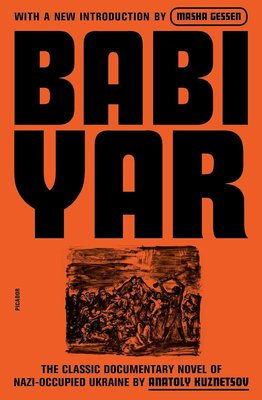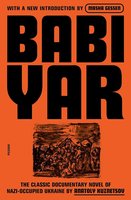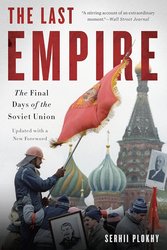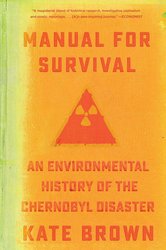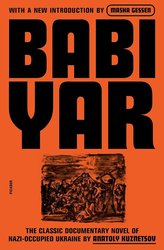"[A] masterpiece . . . Babi Yar [is] every bit the peer of the canonical works of witness [such as] Anne Frank's diary . . . Wiesel's Night . . . Solzhenityn's Gulag Archipelago . " ―George Packer, The Atlantic An internationally acclaimed documentary novel that describes the fateful collision of Russia, Ukraine, and Nazi Germany, and one of the largest mass executions of the Holocaust, with a new introduction by Masha Gessen. “I wonder if we shall ever understand that the most precious thing in this world is a man’s life and his freedom? Or is there still more barbarism ahead? With these questions I think I shall bring this book to an end. I wish you peace. And freedom.” At the age of twelve, Anatoly Kuznetsov experienced the Nazi invasion of Ukraine, and soon began keeping a diary of the brutal occupation of Kiev that followed. Years later, he combined those notebooks with other survivors’ memories to create a classic work of documentary witness in the form of a novel. When Babi Yar was first published in a Soviet magazine in 1966, it became a literary sensation, not least for its powerful and unprecedented narratives of the Nazi massacre of the city’s Jews, and later Roma, prisoners of war, and other victims, at the Babi Yar ravine―one of the largest mass killings of the Holocaust. After Kuznetsov defected to Great Britain in 1969, he republished the book in a new edition that included extensive passages censored by the Soviets, along with his later reflections. In its fully realized form, Babi Yar is a classic of Holocaust and World War II testimony. With sustained immediacy, it relates a scrappy but principled boy’s day-to-day fight to survive and provide for his family. He dodges bullets and avoids transport to Germany, befriends black market horse dealers and pre-revolutionary aristocrats, wonders at the pomp of the Nazi’s opera performances, overhears his mother and grandparents debate the merits of German versus Soviet rule, collects grenades, digs hiding places, and confronts the moral dilemmas of assisting neighbors or looting stores―all the while hearing the constant hum of bullets at the Babi Yar ravine nearby. In a bravura feat of reporting, he tells the story of what happened at Babi Yar―from the deceptive roundup of the city’s Jews and execution of the national soccer team, to the memories of the site’s few survivors and the story of a daring escape. The book’s once-censored passages explore the Soviet effort to hide the realities of the massacre and other facts about wartime that the regime did not want discussed. In the manner of Elie Wiesel’s Night or The Diary of Anne Frank , here is a book that tells some of the most uncomfortable truths of the past century―and the most essential.
